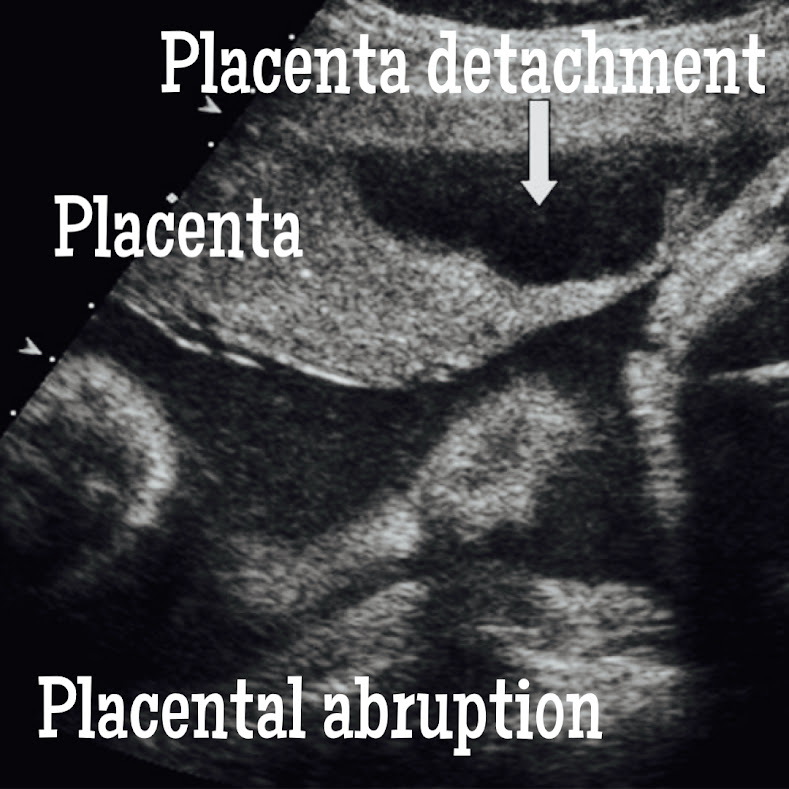Placental abruption is a serious condition that occurs when the placenta separates from the uterine wall before childbirth. The good news is that it’s not very frequent. Roughly one percent of pregnant women will experience placental abruption. It can happen at any point after 20 weeks of pregnancy, but it is more frequent during the third trimester. In this article I am going to give you an easy guide to understand everything about Placental abruption, we’ll also discuss the most common Causes of Placental Abruption, you’ll also see an ultrasound image of Placental abruption in this article. Ready? Let’s begin.
Everything you need to know about Placental Abruption.
What is the Placenta and why is so important?
The placenta is very important because it performs crucial functions for the development of a normal pregnancy.
The placenta is a transitory organ that forms during the first trimester. Among the important function the placenta performs we have:
- Through the placenta, the exchange of nutrients and waste from the mother to the baby and vice versa occurs.
- The placenta has a thermo-regulatory function so that the temperature inside the womb is optimal for the baby.
- In addition, the placenta keeps the baby protected from infections.
- Hormone production: Chorionic gonadotropin, progesterone and placental lactogen are produced by the placenta.
- The placenta also protects the fetus from maternal immune response, preventing the woman’s body from rejecting the fetus as a foreign body.
What are the most common Signs and Symptoms of Placental Abruption?
- Abnormal Vaginal Bleeding.
- Discomfort in the abdomen or the back.
- Pain or discomfort in the area of your uterus that is caused by frequent uterine contractions.
Placental abruption can also occur gradually over time, a process that is referred as “chronic abruption.” Below are the signs of Chronic Placental Abruption:
- You have a mild recurrent vaginal bleeding that comes and goes.
- The levels of amniotic fluid start to decrease.
- Your baby isn’t developing as quickly as they should be, or the baby’s heartbeat might start to drop.
Causes of Placental Abruption:
Most of the time the clear causes of placental abruption are unclear. However, your risk can be increased if you do or have one of these things below:
- History of placental abruption in previous pregnancies. If you have experienced it in the past, you have roughly a 10% chance that it will happen to you once more.
- Smoking. According to the findings of one study, the likelihood of a placental abruption occurring in a woman’s pregnancy increases by 40% for every year that the woman smoked before to becoming pregnant.
- Use of cocaine or any other drug. Up to 10% of pregnant women who use cocaine throughout their third trimester deliver their babies prematurely.
- Elevated levels of blood pressure or pre-eclampsia. Work with your doctor ASAP to keep your blood pressure under control.
- Amniotic sac breakage: The amniotic sac is what protects your baby, inside the amniotic sac is the amniotic fluid and your baby. If a rupture of the amniotic sac occurs and leakage of the amniotic fluid occurs, the chances of a placental abruption occurring increase.
- Advanced maternal age. If you are above the age of 35, your chances of experiencing a placental abruption are increased.
- Carrying more than one baby (twin pregnancy) It is possible that the delivery of the first baby will cause the placenta to become detached before the delivery of the subsequent baby.
- Abdominal trauma. If you fall and land on your stomach, have an accident, or any type of injury placental abruption can occur.
- Medical conditions during pregnancy such as uncontrolled Gestational Diabetes can also increase your risks of having placental abruption.
- And lastly if you develop Uterine infections.
If you’ve ever experienced a placental abruption in the past, you need to let your doctor know. They are going to keep a careful eye on you. They might also offer additional advice on how you can stop it from happening again in the future.
Share the post!!

Placental abruption types:
The separation of the placenta can be categorized into three distinct stages, as follows:
Class 1 or minor separation
The symptoms of a class 1 placental abruption include light to no vaginal bleeding, and in some cases, there may not even be any contractions at all. Even while the fetus is not in imminent danger from this degree of dissociation, medical professionals still advise that the mother get therapy and get plenty of rest.
Class 2 or mild separation
When a pregnant woman experiences a class 2 abruption, her symptoms become more severe, she experiences significant bleeding, and she begins to have uterine contractions. The baby’s heart rate may change as a result of the symptoms, which also begin to influence the baby’s overall health. If something like this happens between weeks 24 and 34 of pregnancy, the patient will need to be admitted to the hospital.
Class 3 or severe separation
Because the woman is experiencing a Class 3, also known as a total abruption, she will need to undergo an emergency cesarean section as soon as possible. As a result of the mother’s significant blood loss, it is highly likely that she will require a blood transfusion. In addition, the decision to have a hysterectomy performed will ultimately be made by the attending physician.
Placental Abruption Diagnosis:
Visit a medical professional as soon as possible if you are experiencing bleeding or pain in the abdomen region. In addition to a physical examination and blood tests, you might also have an ultrasound so that they can examine the inside of your uterus.

Placental abruption management:
Because the placenta cannot be reattached, your treatment options will be determined by the severity of the abruption, how far along you are in your pregnancy, and the health of both the mother and the baby.
- If you are less than 34 weeks pregnant, you may have to check into the hospital for monitoring even if your baby’s heart rate is normal and the placental abruption doesn’t appear to be too serious. If your baby seems to be doing well and you are able to stop bleeding, there is a chance that you will be able to go home eventually. In the event that you do go into labor prematurely, you may also be given steroids to assist in the accelerated development of your baby’s lungs.
- Even if you are pregnant for more than 34 weeks, there is a chance that you can still give birth vaginally if the abruption doesn’t seem to be very severe. If it is, and if it is putting either your health or the health of the baby at jeopardy, you will have to have an immediate cesarean section. A blood transfusion might be required for you as well.
Complications Associated with the Placental Abruption:
If only a tiny portion of the placenta separates, it is possible that there may not be many complications as a result. However, if a significant portion of it or all of it detaches from your uterus, it has the potential to cause catastrophic problems for both you and your unborn child. What this could indicate for you is as follows:
- Significant loss of blood that could put you into shock or require you to receive a blood transfusion.
- Issues with the blood’s ability to coagulate.
- Failure of the kidneys or of other organs is possible.
- Death either for you or your unborn child.
If you have a near or total abruption, you will be required to have an emergency cesarean section as soon as possible. If there is an abruption, these are the possible complications for a baby:
- There is the possibility of complications for your unborn child, including premature birth. This indicates that your child was born earlier than 37 weeks. This classification applies to around 10% of infants who are born to women who have placental abruption.
- Your unborn child may have a higher risk of developing health issues both in their early years and in their adult years if they are born prematurely.
- Stillbirth. This indicates that your child passed away while still inside of you after you had been pregnant for a period of at least 20 weeks.
Related posts:
How to get prepared to manage pain during childbirth.
Tips for surviving and cope with a high-risk pregnancy.
For more in deep information about the Placenta click this link: Everything about the placenta. Ultrasound included.
Final thoughts about Everything you need to know about Placental Abruption. Causes of Placental Abruption.
There is usually no way to avoid the risk for placental complications, however there are things you can do to help it go smoothly: If you’re pregnant, it’s important to keep up with your regular doctor’s appointments, controlling health issues like high blood pressure and gestational diabetes. Stay away from tobacco and illegal substances, before opting for an elective C-section discuss the benefits and drawbacks with your doctor.
Talk to your doctor about preventative measures and tests you can take if you’ve already had one or more pregnancies complicated by placental issues and are considering trying again. If you’ve ever had uterine surgery, it’s important to let your doctor know. Throughout your pregnancy, you may count on close observation from your doctor.
Zadi, xo
Disclaimer: The medical information on this post is for educational and entertainment use only. Under no circumstances, this information is to replace your doctor’s advice or to treat any disease. For proper care, always visit your doctor.









